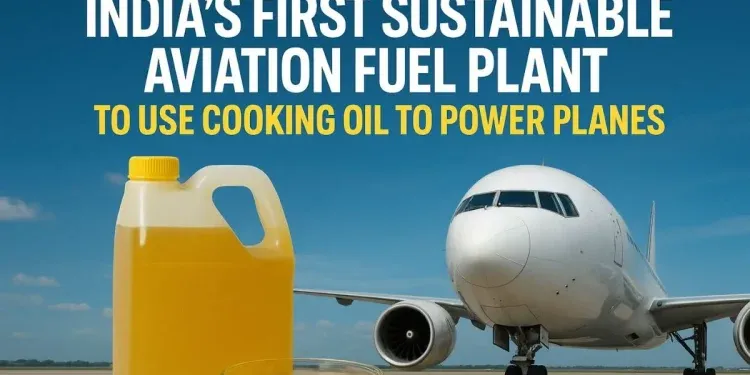New Delhi / Panipat – In a landmark step towards cleaner skies, India’s largest refiner, Indian Oil Corporation (IOC), is set to begin large-scale production of sustainable aviation fuel (SAF) made from used cooking oil by December this year.
The IOC facility, located at its Panipat refinery in Haryana, recently secured international certification for manufacturing the biofuel, paving the way for India’s entry into the global SAF market. According to IOC chairman Arvinder Singh Sahney, the plant will have the capacity to produce 35,000 tonnes of SAF annually.
Turning Waste into Jet Fuel
The feedstock for this eco-friendly aviation fuel will come from discarded cooking oil sourced from large hotel chains, restaurants, and food majors such as Haldiram’s, which typically dispose of the oil after a single use. This circular approach will not only reduce waste but also help curb environmental pollution linked to improper disposal of used cooking oil.
“By the end of this calendar year, IOC will have the capacity to produce 35,000 tonnes per year of SAF, which will be sufficient to meet India’s 1% SAF blending requirement for international flights by 2027,” Sahney stated.
Collection Challenge
While sourcing from major chains is straightforward, the IOC chief admitted that collecting cooking oil from smaller outlets and households poses a significant logistical challenge. To overcome this, IOC plans to work with aggregators who can centralise collection and ensure consistent feedstock supply.
“There is a large amount of such oil available in the country. The only challenge is collection,” Sahney explained. “While it is easy to collect from big hotel chains, a solution needs to be found for smaller users.”
India’s Push for Green Aviation
The move is part of India’s broader commitment to reducing its aviation sector’s carbon footprint. Globally, airlines are under pressure to switch to low-carbon fuels as the aviation industry contributes nearly 2–3% of total CO₂ emissions. Sustainable aviation fuel, which can cut lifecycle greenhouse gas emissions by up to 80% compared to conventional jet fuel, is seen as a game-changer.
The International Civil Aviation Organization (ICAO) has recommended a gradual blending of SAF into jet fuel supplies, and India is aligning with this global target. IOC’s Panipat facility will play a pivotal role in ensuring that the country is ready for its first mandatory SAF blending requirement for international flights in 2027.
Economic and Environmental Impact
Experts say that India’s entry into commercial-scale SAF production could attract international airlines to refuel in the country, potentially boosting India’s aviation hub ambitions. At the same time, the project supports the government’s ‘Waste to Wealth’ initiative by converting used cooking oil into a high-value fuel.
With 35,000 tonnes per year of capacity, IOC’s SAF initiative will not only meet India’s initial blending targets but also set the stage for future expansion. If successful, it could inspire private refiners and other oil majors to invest in similar facilities, expanding India’s biofuel landscape.







